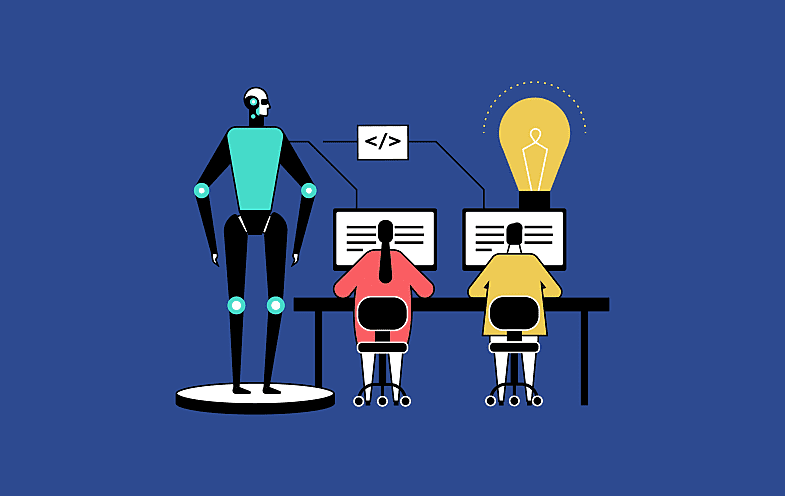Artificial Intelligence apps harness the power of AI to analyze data, interpret patterns, and give desired results, all at your fingertips. From generating texts to images, from editing media files to setting reminders, and from making strategies to personalized conversations, AI apps can do all complex tasks effortlessly. Read More
List of Popular AI Apps of 2024
AI Pal
Leena AI
Fotor
Facetune
PicsArt
Hatchful
Clony AI
Spotify
Genie
In this article:
- What are the benefits of Artificial Intelligence apps?
- Understanding Different Types of AI Applications
- How did our Experts select these Best AI Apps?
- What are the most popular AI apps right now?
- What are the most advanced AI apps?
- Pros and Cons of AI Apps
- The Role of AI Apps in Shaping Future Trends
- Why Security and Privacy are Important in AI Apps
- What Points Should You Keep in Mind While Securing Your Data?
- Final Verdict!
What are the benefits of Artificial Intelligence apps?
Artificial intelligence and machine learning algorithms drive the best AI apps, which offer several advantages. Here are some of the benefits of AI apps:
1. Personalized Experience
AI apps can use personal data to learn about your preferences, behavior, and needs. This allows these apps to give you personalized suggestions, information, and experiences you're more likely to enjoy and engage with.
2. Provide Improved Efficiency
AI-powered chatbots and AI virtual assistants may offer 24/7 support, addressing your queries and concerns. This improved efficiency allows these apps to enhance your needs and satisfaction instantly.
3. Good Product Recommendations
AI algorithms read your every action, and according to those preferences, they suggest relevant products and services. These AI apps recommend products based on your interests and collective data.
4. Faster Issue Resolution
Through AI-driven analytics, these AI apps and tools can identify your issues and resolve them swiftly, minimizing disruptions and improving experience.
5. Voice and Image Recognition
AI-powered voice and image recognition apps simplify tasks. You can simply use voice commands or images for searches, inquiries, and actions, offering a more natural and convenient interface.
6. Continuous Learning
Best AI apps adapt the way you interact and improve over time. Now, they provide more accurate responses, suggestions, and recommendations after reading your interests.
7. Effortless Decision-Making
AI-powered comparison tools allow you to make informed decisions by presenting options, features, and benefits. This will help you with a smooth decision-making process and boost your confidence.
8. Data Security and Privacy
AI apps can enhance security by detecting unusual activities and patterns that might signal a breach. These AI applications save your data and ensure a secure online transaction environment.
9. Seamless Multichannel Experience
AI-powered apps provide consistent experiences across different channels, such as websites, mobile apps, and social media. This seamless integration helps you in clear interactions and ensures continuity.
10. Accessibility Enhancement
Popular AI apps can assist you with disabilities, offering text-to-speech, speech-to-text, and other features that make content and interactions more accessible and inclusive.
By using free artificial intelligence apps and machine learning technology, you can improve processes and enhance experiences. However, ensuring that AI is used ethically and responsibly is critical to address possible problems such as prejudice, privacy, and data security.
Understanding Different Types of AI Applications
1. Generative AI Apps
These applications use generative models, like GANs (Generative Adversarial Networks), to create new content, including images, videos, text, and music. They can generate realistic and original outputs based on the data they've been trained on, useful in design, art, and content creation.
Here are some examples of GenerativeAI apps:
- ChatGPT
- Gemini AI
- WOMBO Dream
- Bing AI
2. Conversational AI Apps
Conversational AI encompasses chatbots and virtual assistants that simulate human-like interactions through natural language processing (NLP). These apps can handle customer service inquiries, automate tasks, and provide personalized recommendations or assistance through text or voice communication.
Here are some examples of Conversational AI Apps
- Replika AI
- AI Pal
- Stimuler
- Ask AI
3. AR (Augmented Reality) Apps
Augmented Reality apps overlay digital content onto the real world through a device's camera, enhancing real-life environments with virtual elements. These apps are popular in gaming, education, and retail, offering interactive experiences that blend physical and digital worlds.
4. VR (Virtual Reality) Apps
Virtual Reality applications immerse users in a completely virtual environment, often requiring a VR headset. These apps provide highly engaging experiences in gaming, simulation training, education, and virtual tours, offering a sense of presence in a digitally created space.
Here are the examples of VR Apps
- YouTube VR
- Littlstar VR
- NYT VR
- Netflix VR
5. AI Assistant Apps
AI assistants, such as Siri, Alexa, and Google Assistant, use AI to perform tasks via voice commands. These apps can schedule appointments, send messages, make calls, provide weather updates, and control smart home devices, making daily tasks more convenient through voice-activated technology.
Here are some examples of AI Assistant Apps
- Siri
- Alexa
- Google Assistant
- Bixby
6. AI Marketing Apps
These applications leverage AI to enhance marketing strategies, offering tools for customer data analysis, predictive analytics, personalized content creation, and automated decision-making. AI marketing apps help businesses target the right audience, optimize campaigns, and improve customer engagement and conversion rates.
Here are some examples of AI Marketing Apps
- Hatchful
- Leena AI
- ChatGPT
How did our Experts select these Best AI Apps?
Our experts have listed the best AI apps through a complete evaluation process that includes the following steps:
1. Research
To find out the best AI apps for you, our experts conduct extensive research to identify a wide range of AI apps in a specific category or field. They consider apps that have received recognition, awards, or positive reviews from reputable sources.
2. Criteria Development
Our experts establish a set of criteria for evaluating AI apps based on the intended use and the specific needs of users. These criteria may include factors like functionality, user-friendliness, data privacy, security, customer support, and cost.
3. User Feedback
They analyze user feedback and reviews from various sources, including app stores, tech forums, and independent review sites. This helps in understanding real-world experiences and identifying common issues or strengths.
4. Testing and Evaluation
Our experts may conduct hands-on testing of the free AI apps to assess their performance, features, and user interface. This firsthand experience allows them to provide in-depth insights.
5. Privacy and Security Assessment
Our experts scrutinize the privacy policies and security measures of the best AI programs to ensure they meet industry standards and protect user data.
This expert review will help you choose the finest AI software to improve your efficiency, productivity, and overall performance by carefully examining these characteristics and matching the free AI app with your required goals.
I hope you are clear on what apps you must select for your requirements. But knowing the trend isn’t a bad option, so you must be curious about the current popular apps. Here we are:
What are the most popular AI apps right now?
Here is the list of some of the most popular apps you must go through:
1. ChatGPT
A leading AI chatbot, ChatGPT, can understand you, respond to your questions, and create a new text. Writing material such as articles, emails, scripts, essays, and code is a common use for ChatGPT. Its developer, OpenAI, also created GPT-4, DALL-E, and DALL-E 2 AI models.
2. Gemini AI (formerly Google Bard)
Google's experimental and conversational AI chat service, Gemini AI, is used for coding, solving math issues, and assisting you with your writing needs. The application is similar to ChatGPT, but being Google’s service, the information Gemini AI (formerly Bard) provides is directly from the web.
3. Bing
Microsoft Bing has a long history as an online search engine, but it can also be used as a chatbot to answer inquiries, generate original text and graphics, and translate and edit writing in a variety of languages. The content for Bing's conversation function, accessed via a mobile app, Bing.com, and Microsoft Edge, is produced using GPT-4 technology.
4. Facetune
Facetune is a well-known tool for users wishing to modify their pictures and videos rapidly. It is frequently used to add makeup, change the form of the face, and touch up the skin and teeth. Additionally, the app offers an avatar maker that enables users to improve their selfies with AI-generated outfits, haircuts, backdrops, and other elements.
What are the most advanced AI apps?
Along with popular apps, many advanced apps are fully-fledged with features like compatibility, adaptability, and flexibility. So, let’s explore some advanced AI apps -
1. Otter.AI
Otter.ai offers various services, including the capacity to record Zoom and Google video conferences and phone calls, and is accessible both online and as a mobile app. The speaker automatically breaks down these recordings by applying artificial intelligence in transcription.
2. Youper
Youper is a mental health-focused AI chatbot that engages people in conversation about their emotional struggles and provides individualized guidance and coping mechanisms. The program also offers personality tests, a variety of mindfulness exercises, a mood tracker, and other features. Youper asserts, like Woebot, that their technology is founded on decades of psychological and scientifically supported therapy.
3. Lensa
With its capability to produce artistic edits and iterations of user-provided selfies, Lensa has completely taken over social media. To take mobile photography and video production “to the next level,” Prisma Labs developed Lensa. The app employs neural networks, computer vision, and deep learning methods. Users of the program can add anything they want, from simple adjustments like blurring the background to creative renderings.
4. Alexa
Amazon's Alexa has gained widespread recognition since its inception in 2014. The AI voice assistant can make lists, set alarms, and place online orders. Because of its advanced natural language processing skills, Alexa can recognize and produce spoken language through fluid dialogues with users. The app may control smart thermostats, wearables, televisions, and even cars directly from the user's phone when coupled with other smart devices.
Pros and Cons of AI Apps
AI apps have become an integral part of our digital lives. These smart apps offer numerous pros and cons:
1. Pros and Cons of Free Version
| Pros | Cons |
|---|---|
| Cost-Free | Limited Features |
| Basic Features | Ads and Promotions |
| Trial Opportunity | No Customization |
2. Pros and Cons of Paid Version
| Pros | Cons |
|---|---|
| Full Feature Set | Lack of Free Trial |
| Offline Access | No Refunds |
| Enhanced Security | High Cost |
The Role of AI Apps in Shaping Future Trends
The role of AI apps in shaping future trends is significant and transformative. Here are five key points:
1. Personalization and User Experience
AI apps will continue to enhance user experiences by delivering personalized content, recommendations, and services. They can adapt to individual preferences, ultimately shaping how users interact with technology.
2. Automation and Efficiency
AI apps will revolutionize industries by automating routine tasks, improving efficiency, and reducing human intervention. This trend will impact various sectors, from manufacturing to customer service.
3. Data Analysis and Insights
AI apps will play a pivotal role in processing and interpreting vast amounts of data, providing valuable insights and enabling data-driven decision-making. This will influence business strategies, research, and policy development.
4. Healthcare Advancements
AI apps will drive innovations in healthcare, from diagnostic tools to patient monitoring. They will contribute to early disease detection, personalized treatment plans, and the optimization of healthcare delivery.
5. Ethical and Regulatory Considerations
The development and deployment of AI apps will lead to ongoing discussions about ethical use and regulatory frameworks. Issues like privacy, bias, and accountability will shape future trends as societies seek to balance technological advancements with responsible AI practices.
Why Security and Privacy are Important in AI Apps
Common concerns related to the security and privacy of AI apps, include:
1. Data Breaches
Data breaches are one of the major concerns of the users, as they are worried about their personal data being compromised due to insufficient security measures, potentially leading to identity theft or other forms of cybercrime.
2. Unauthorized Access
As there are many apps that ask for your personal details like your number, email address, and more, there might be concerns about unauthorized access to sensitive information, such as financial or healthcare data.
3. Data Misuse
There is a huge concern among people about the misuse of their personal or sensitive data. So, users fear that their data may be used for purposes they didn't consent to, such as targeted advertising.
4. Lack of Transparency
Users often don't understand how their data is collected, processed, or shared, making it difficult to trust AI apps with their information.
5. Regulatory Compliance
Users may question whether AI apps comply with data protection laws and regulations, particularly in regions with stringent privacy standards like the European Union's General Data Protection Regulation (GDPR).
What Points Should You Keep in Mind While Securing Your Data?
Protecting your data from AI apps is essential to safeguard your privacy and security. Here are five tips for users to achieve this:
1. Read Privacy Policies and Permissions Carefully
Before installing and using an AI app, you should thoroughly review its privacy policy and the permissions it requests. Understand what data the app collects, how it will be used, and whether it shares data with third parties. You can consider alternatives if the policy is unclear or overly invasive. You need to be cautious when apps request excessive permissions that seem unrelated to their functionality.
2. Control App Permissions
You can review and manage the permissions granted to AI apps on your device. Also, apps should be limited in access to sensitive data like location, contacts, or camera unless it's necessary for their core functionality. Adjust these settings in your device's privacy or app permissions menu to ensure that AI apps have the minimum access required.
3. Update Apps and Devices Regularly
Keep both your apps and your device's operating system up to date. Developers often release updates to patch security vulnerabilities and improve data protection features. Staying current with these updates helps to protect your data from potential threats.
4. Use Strong, Unique Passwords
Implement strong, unique passwords for your accounts associated with AI apps. Consider using a reputable password manager to generate and store complex passwords. This practice adds an extra layer of security, reducing the risk of unauthorized access to your accounts.
5. Monitor App Usage and Settings
Periodically review the apps you have installed and the permissions they hold on your device. If you no longer use a particular app or are uncomfortable with the data it collects, consider uninstalling it. Regularly check app settings to ensure that privacy and security preferences remain in line with your expectations.
Final Verdict!
The world of best AI apps offers innovative and transformative solutions that have significantly impacted various industries and user experiences. Youper is a compassionate mental health companion among the top AI apps, utilizing AI to provide personalized emotional support and self-care tools. Its empathetic approach and continuous learning make it valuable in improving mental well-being.
While these best AI apps showcase the capability of AI in many sectors, they collectively illustrate AI's enormous potential to better our lives, from mental health care to interactive companionship and innovative picture manipulation. These best AI apps highlight the tremendous potential of trending AI apps as technology improves.
Lastly, if you own an app and want to list your product on MobileAppDaily, please get in touch with us. Our professional expertise will expand the reach of your app and assist you in its growth and development. Meanwhile, visit MobileAppDaily for more updates and information on mobile apps and other topics.
With our strategically designed marketing solutions














 Previous
Previous






